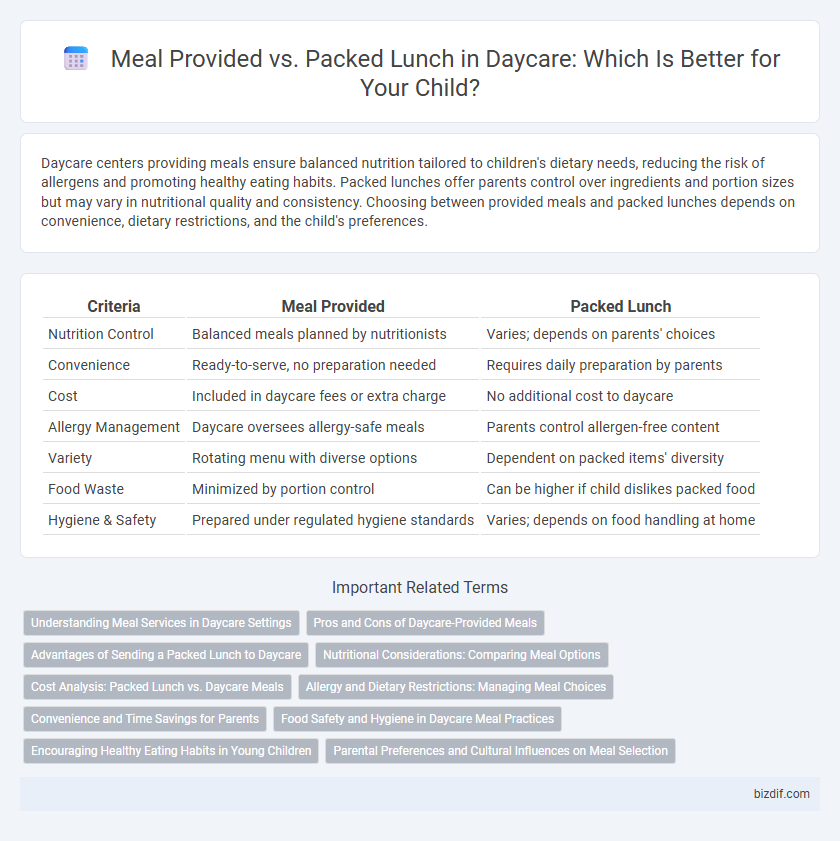Daycare centers providing meals ensure balanced nutrition tailored to children's dietary needs, reducing the risk of allergens and promoting healthy eating habits. Packed lunches offer parents control over ingredients and portion sizes but may vary in nutritional quality and consistency. Choosing between provided meals and packed lunches depends on convenience, dietary restrictions, and the child's preferences.
Table of Comparison
| Criteria | Meal Provided | Packed Lunch |
|---|---|---|
| Nutrition Control | Balanced meals planned by nutritionists | Varies; depends on parents' choices |
| Convenience | Ready-to-serve, no preparation needed | Requires daily preparation by parents |
| Cost | Included in daycare fees or extra charge | No additional cost to daycare |
| Allergy Management | Daycare oversees allergy-safe meals | Parents control allergen-free content |
| Variety | Rotating menu with diverse options | Dependent on packed items' diversity |
| Food Waste | Minimized by portion control | Can be higher if child dislikes packed food |
| Hygiene & Safety | Prepared under regulated hygiene standards | Varies; depends on food handling at home |
Understanding Meal Services in Daycare Settings
Daycare meal services often offer nutritious, balanced options designed to meet pediatric dietary guidelines, ensuring children receive appropriate portions of fruits, vegetables, proteins, and grains. Packed lunches rely on parents' choices, which may vary in nutritional quality and portion size, impacting overall child health and energy levels. Evaluating the consistency and nutritional content of daycare-provided meals versus packed lunches is essential for supporting optimal child development and wellbeing.
Pros and Cons of Daycare-Provided Meals
Daycare-provided meals offer convenience and ensure nutritional standards are met, supporting balanced diets tailored to children's developmental needs. However, they may lack customization for specific allergies or dietary preferences compared to packed lunches from home. Cost and menu variety can also vary, influencing parental choice between daycare meals and bringing food from home.
Advantages of Sending a Packed Lunch to Daycare
Sending a packed lunch to daycare ensures better control over a child's nutrition, allowing parents to include specific dietary preferences, allergies, or organic ingredients. Packed lunches often reduce the risk of food waste since portions can be tailored to the child's appetite. This personalized approach supports consistent eating habits and can promote healthy development during early childhood.
Nutritional Considerations: Comparing Meal Options
Daycare-provided meals are often designed by nutritionists to meet specific dietary guidelines, ensuring balanced portions of proteins, carbohydrates, and vegetables tailored to children's growth needs. Packed lunches vary widely in nutritional value depending on parental choices, sometimes lacking essential nutrients or including excessive sugars and fats. Evaluating meal options based on nutrient density, ingredient quality, and portion control is crucial for supporting healthy childhood development in daycare settings.
Cost Analysis: Packed Lunch vs. Daycare Meals
Daycare meals often present a cost-effective alternative to packed lunches, with average daily meal costs ranging from $4 to $6 compared to the higher expenses of individually packed lunches due to purchasing diverse ingredients. Nutritional balance provided by daycare meals, which adhere to standardized dietary guidelines, reduces the need for extra snacks, further minimizing overall food expenses for families. Evaluating hidden costs such as time spent preparing packed lunches and potential food waste highlights the economic efficiency of opting for daycare-provided meals.
Allergy and Dietary Restrictions: Managing Meal Choices
Daycares that provide meals can better control allergy and dietary restrictions by preparing foods in sanitation-compliant kitchens and carefully monitoring ingredient lists, reducing the risk of cross-contamination. Packed lunches rely on parents' vigilance to avoid allergens, which can increase the chance of accidental exposure and complicate staff supervision. Implementing clear communication protocols between caregivers and parents is essential to safely manage diverse dietary needs in both scenarios.
Convenience and Time Savings for Parents
Daycare centers offering meals provide significant convenience and time savings for parents by eliminating the need to prepare and pack lunches daily. Ready-to-serve meals ensure children receive balanced nutrition without morning rush stress, freeing up valuable time for parents. This streamlined approach supports busy schedules and reduces the risk of forgotten or inadequate lunches.
Food Safety and Hygiene in Daycare Meal Practices
Daycare centers prioritize food safety and hygiene by providing meals that meet stringent nutritional and sanitation standards, reducing the risk of contamination compared to packed lunches from home. Meals prepared onsite allow trained staff to enforce proper cooking temperatures, allergen controls, and handwashing protocols, ensuring a safer eating environment for children. Properly managed daycare meals minimize exposure to foodborne illnesses, promoting overall child health and well-being.
Encouraging Healthy Eating Habits in Young Children
Daycare centers that provide balanced, nutritious meals help establish healthy eating habits in young children by offering portion-controlled servings of fruits, vegetables, whole grains, and lean proteins. Packed lunches from home can vary widely in nutritional quality, so daycare staff can guide parents on including nutrient-dense foods and minimizing sugary snacks. Promoting consistent exposure to diverse, wholesome foods during daycare hours supports early taste development and lifelong healthy eating patterns.
Parental Preferences and Cultural Influences on Meal Selection
Parental preferences for daycare meals often reflect cultural influences that shape meal selection, with some families favoring provider-provided meals for convenience and nutritional assurance while others insist on packed lunches to maintain traditional dietary practices. Cultural values significantly impact choices, as parents from diverse backgrounds prioritize familiar flavors and ingredients that align with their home cuisine, ensuring children's acceptance and comfort during mealtime. Studies indicate that accommodating cultural meal preferences in daycare settings enhances children's dietary satisfaction and supports family engagement in nutrition planning.
Meal provided vs Packed lunch Infographic

 bizdif.com
bizdif.com